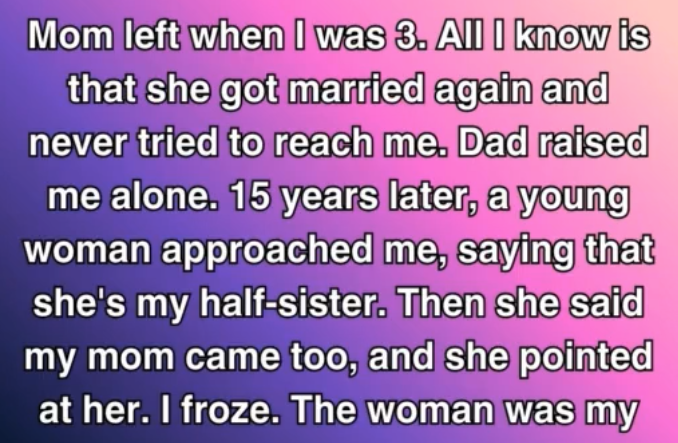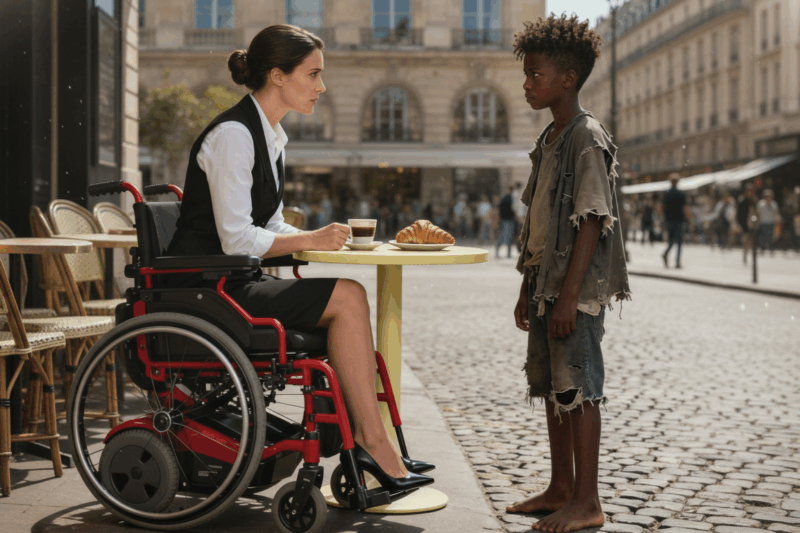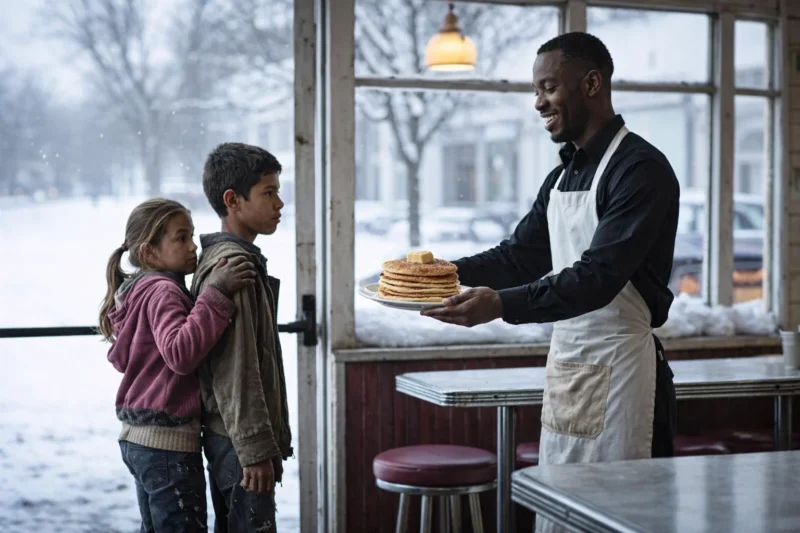When I was three, Mom vanished from my life. She remarried and never reached out to me. Dad became my everything, raising me single-handedly. Fifteen years passed, and then a young woman approached me, introducing herself as Zara, my half-sister. She gestured toward a woman nearby and said, “Mom’s here too.” My heart stopped. The woman was my mother, Naima, but she didn’t resemble the faint image in my mind.
She stood poised, blonde hair gleaming, gripping a designer purse like a lifeline. At the park’s edge, she seemed ready to slip back into a world of luxury sunglasses worn indoors.
Zara, my half-sister, radiated warmth. Her eyes mirrored mine, and a familiar freckle dotted her lip, as if Mom had duplicated a piece of me. “She’s nervous,” Zara whispered, nudging me. “She wasn’t sure you’d want to see her.”
I hadn’t wanted anything. I didn’t even know they were coming.
Dad, it turned out, had been communicating with Zara in secret. He believed I deserved the chance to decide for myself. His surprise felt like a betrayal, but I couldn’t stay angry—he’d always shielded me.
So there I stood in the park, my stomach churning, facing the woman who’d walked away without a glance back.
No embrace followed. She stepped toward me, hesitated, and stopped.
“Hi, Mian,” she said, her voice carrying the nickname she’d given me before she left.
The word unlocked a memory I’d buried deep. I nodded, unable to speak.
We sat on a bench, Zara bridging the silence with her chatter. “Mom’s wanted to see you for years,” she said. “She thought you might resent her.”
Resentment wasn’t it. I’d convinced myself I didn’t need her.
Or so I believed.
The past, I learned, doesn’t vanish because you ignore it.
Naima shared her story. She was young, battling depression after my birth. Dad, working three jobs, dismissed her struggles as theatrics. “I was unraveling,” she said. She met a man in a support group, connected deeply, and when he offered her a new life, she took it. She claimed she wanted to take me but believed I’d thrive with Dad.
“Leaving a child isn’t for their good,” I said, my voice breaking despite my resolve.
She winced. “I was a coward. I thought I’d destroy you. I was already destroying myself.”
Seeing her as my mother felt impossible. Looking away felt harder.
We met again the next week, then the week after. Sometimes Zara joined, sometimes it was only Naima and me. I asked questions I didn’t know I’d carried.
“Did you miss me?”
“Every day.”
“Then why stay away?”
“I thought you’d reject me. I feared I’d hurt you more.”
I wasn’t sure what to believe, but I wanted to trust her words.
Over months, something unexpected grew. I began to like her—not as Mom, not yet, but as Naima, a woman who laughed nervously and shared homemade bread tied to my grandmother’s recipe.
She didn’t seek forgiveness. She simply kept appearing.
And that persistence changed things.
Forgiveness isn’t a single act. It’s a slow unraveling, built layer by layer.
But then came a twist.
Dad found out—not from me, but from a neighbor who saw me hugging Zara outside a café. That night, he cooked his signature lentil stew, acting as if it were any other Thursday. Then he spoke:
“I know you’ve been seeing your mother.”
My spoon clattered to the table.
He didn’t raise his voice. He looked weary, as if I’d reopened an old scar.
“She left, Mian. I held you through every tear you shed for her. I stayed.”
“I know, Baba,” I said. “But I needed answers.”
He nodded. “I’m not upset. Be cautious. The past can seem kinder than it was.”
His words lingered.
Weeks later, cracks appeared. Zara texted me late, her voice trembling on the phone. “She’s drinking again,” she said. “She’s fighting with my dad. She threw a plate. It nearly hit me.”
My stomach sank.
I confronted Naima. She admitted it. “I had a rough patch,” she said. “I relapsed. I’m seeking help again.”
I didn’t know how to respond. Part of me wanted to retreat, but Zara was innocent in this. My half-sister deserved a family that held together.
So I stepped in. I spent more time with Zara, helped her with schoolwork, and let her stay at our place when her home became chaotic.
Dad stayed quiet but observant. One day, he made an extra bowl of stew for her. “She shouldn’t suffer for her mother’s choices,” he said.
His gesture softened me.
Naima’s spiral deepened. Two months later, she entered rehab voluntarily. Before she left, she wrote me a letter. She didn’t ask me to wait. She said she was proud of the man I’d become.
“I may not earn the title of Mom again,” she wrote, “but I’m grateful I met the person my baby grew into.”
Her words broke me.
Six weeks later, she emerged sober. Something had shifted. She stopped trying to prove herself and started living better—working at a community kitchen, making amends without fanfare.
One evening, at Zara’s birthday dinner at a cozy Thai restaurant, Naima and Dad met. Neither expected the other.
He sat across from her, said hello. She thanked him for raising me.
For the first time, I saw calm between them.
Not flawless. Not fully mended. But close.
Six months later, Zara started a nursing program. Naima helped her settle into her dorm. I brought snacks and tried not to tear up.
When Zara hugged me goodbye, she said, “You’re the best big brother I could’ve imagined.”
“Same to you, half or whole,” I said, and we laughed.
Two years have passed.
Naima now volunteers at a women’s shelter. Dad welcomes her to holiday dinners. They’re not friends, but they share space with grace.
I’ve learned people aren’t defined by their worst moments.
Some leave because they’re shattered. Some return and strive to be better.
Forgiveness isn’t erasing the past. It’s choosing peace over pain.
And sometimes, that peace builds a bigger family than you began with.
If this story resonated with you, share it or give it a like. Someone out there might need its message.




